Drilling in Dallas
Send an E-mail to Dallas Plan Commission Today, Turn Out for Setback Showdown Tomorrow
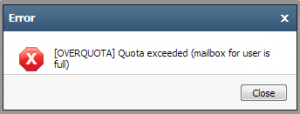 Thursday's showdown at the Dallas Plan Commission over a 1500-foot setback between gas wells and "protected uses" like homes and schools is picking up steam.
Thursday's showdown at the Dallas Plan Commission over a 1500-foot setback between gas wells and "protected uses" like homes and schools is picking up steam.
After Commission members get lobbied during their morning session by City Attorney Tammy Palomino to "reconsider" their previous support of the extended buffer zone, local municipal Attorney Terry Welch, who's advised Flower Mound and Southlake on their gas drilling ordinances, has agreed to come to the afternoon public hearing and give a detailed presentation defending the distance. He'll also highlight other issues critical to a truly protective gas drilling ordinance, including drilling in parks, full disclosure of chemicals, and requiring first-ever air pollution off-sets of the gas industry.
Welch was a member of the Dallas Gas Drilling Task Force and his presentation of its "minority report" to the full City Council last August drew a lengthy and sustained standing ovation from the audience that even got Mayor Rawlings' attention.
From 8:30 am to 12 noon on Thursday the Plan Commission will continue its March through the construction of a draft gas drilling ordinance, including revisiting the 1500-foot setback provision, and discussing other issues like Emergency Response.
At 1:00 pm, citizens will start to gather for a pre-hearing news conference. At 1:30 we'll go into the council Chambers and wait for the public hearing on the draft ordinance to begin. It's very possible the Commission will have already decided to support or revise the 1500-foot setback by the time the hearing begins – we'll know by the press conference. If we win retention of 1500, then please thank the Commission and tell them what else you think should be included in a new ordinance. If they back down in the face of pressure from Palomino, then be prepared to raise hell and complain loudly. It's bad enough we have to fight a billion-dollar industry. We shouldn't also have to fight city staff that's supposed to be deciding policy based on the public interest, instead of secret agreements.
Remember, a 1500-foot setback for gas wells means a practical end to any attempt to bring back the Trinity East permits if the Plan Commission's denial of them is upheld at next Wednesday's Council vote. It also means fewer Dallas neighborhoods at risk from being fracked at all. This is a big deal.
We really need butts in the seats to show them you still care and they're still being watched. If you can make it down on Thursday, we know your presence will have an impact.
But we also realize that the Powers That Be are making it hard for the public to participate in their public hearings by scheduling them only during weekday business hours.
So whether you're planning on showing up or not, we've made it easy for you to let the Commission know before Thursday morning how you feel about any reconsideration of the 1500 foot setback. In less than a minute, you can click and send an e-mail to the Commission members supporting the extended buffer zone. JUST CLICK HERE. Please do this today so that when we roll into Thursday morning, Ms. Palomino will have to swim upstream against overwhelming public opposition in trying to persuade the Commission to reduce the setback. We win this round, we go a long way toward winning the whole fight. Thanks very much for hanging in there with us.
State Ignores Latest Failure and Local Air Committee, Will Host “Public Information Meeting” on DFW Smog
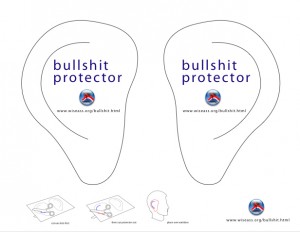 This curt announcement went out last Friday courtesy of the Texas Commission on Environmental Quality:
This curt announcement went out last Friday courtesy of the Texas Commission on Environmental Quality:
The Texas Commission on Environmental Quality (TCEQ) will host a public information meeting to provide information on the development of revisions to the SIP for the 2008 ozone National Ambient Air Quality Standard (NAAQS) in the 10-county Dallas-Fort Worth (DFW) nonattainment area. The meeting will take place on Thursday, September 5, 2013 at 10:00 a.m. at the North Central Texas Council of Governments (NCTCOG), Transportation Council Room, 616 Six Flags Drive, Arlington, Texas 76005. NCTCOG and United States Environmental Protection Agency (EPA) representatives will also provide updates on local and federal initiatives.
What this doesn't say is that the last local clean air plan drafted by Rick Perry's TCEQ failed miserably last summer when DFW actually ended up with worse air than when it had begun in 2010. The state can't even bring itself to admit that. It's never had a successful smog plan in DFW, but only Rick Perry's TCEQ plan actually made the air worse. Maybe that's why they're holding this "public information meeting" at a mid-morning time guaranteed to result in a low rate of participation by actual DFW citizens.
You'd also never guess from this release that DFW has a local advisory board for drafting its own clean air plans. The North Texas Clean Air Steering Committee was constituted specifically for the purposes of working with the state on such plans. It hasn't met in two years. Nor is it likely to meet anytime soon if Rick Perry's TCEQ has its way – the state considers it a nuisance to have to come up here and explain itself to local elected officials and environmentalists.
Did we say environmentalists? Since the 2006-2007 smog plan, citizen groups have held three seats on the Committee to balance out the three seats given the local Chambers of Commerce. Right now those seats are held by Downwiders at Risk, the Sierra Club/Public Citizen and the Environmental Defense Fund. The rest of the slots are filled by local city council members, Mayors, County Commissioners and County Judges.
Downwinder's own Jim Schermbeck is a member and has used the meetings of the Committee to cross-examine Rick Perry's TCEQ officials who otherwise receive a mostly unquestioning welcome everywhere else they go. Committee meetings are the one place that representatives fo citizens groups can ask questions like a legislator in an Austin hearing. And the TCEQ reallly doesn't like that. Especially when we've been right about so many things and the TCEQ so wrong.
It's also true that Rick Perry's TCEQ really doesn't even bother to start any kind of consultation or planning process in DFW until a year before the plan is due. Since a new plan to achieve the new ozons/smog standard of 75 parts per billion doesn't kick in until 2015, it's doubtful the Committee will be called to order before next Spring. That way the pollution control measures needed by any plan have no chance of passing a state legislature at the last moment in 2015, ensuing that no real changes take place and DFW remains smoggy.
Perhaps you think that's way too cynical a perspective. But that's exactly what happened this last cycle in 2010-2011. And it was actually worse, because the biggest part of that last plan was to sit back and watch as DFW residents bought new cars. No moving parts.
Meanwhile, can anyone name a current local elected official who's known for their advocacy of clean air? Dallas Mayor Laura Miller fought Perry's coal plants in 2006. in 2013, her successor, Dallas Mayor Mike Rawlings protects secret deals with gas drillers. Dr./Mayor Cluck in Arlington has voted in favor for dozens, if not hundreds, of gas wells near homes, parks, and day care centers even as he recites his familiar litany about running into childhood asthma victims in the hospital emergency room. Fort Worth? Bought and sold to Chesapeake. Dallas County? They're too busy indiscriminately dropping pesticides on us. Mayor Evans of Plano used to be a voice of reason in Collin County. Now you've got Judge Keith Self who never met an air polluter he didn't liked.
Some stalwarts like Parker County Judge Mark Riley and Tarrant County Judge Glenn Whitley still represent moderate Republican views, but many of their peers have been replaced by Tea Party members who think smog is as imaginary a problem as climate change. We're actually going backwards in our local political engagement of the issue.
If TCEQ is emasculating the local advisory group on clean air, it's certainly getting a valuable assist from a feckless DFW indigenous officialdom, who seemed to have all walked away as a group from clean air as a goal they were willing to strive to achieve.
So mark your calendars for another citizen-friendly TCEQ "public information meeting"….at 10 am on a Thursday morning, September 5th, in Arlginton at North Texas Council of Government headquarters, when most people will be working and unable to attend. For for the sensitive among you, we suggest also attending with some handy BS protectors for your ears so as not to irrevokably damage logic receptors in the brain.
To the Barricades: 2 Hearings in 2 Weeks to Protect What We’ve Already Won in Dallas
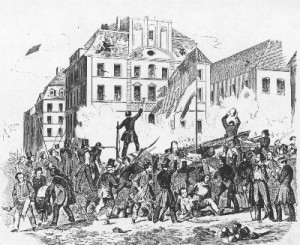 What residents have accomplished in Dallas since last December is nothing short of amazing when you step back for a moment. They took a "done deal" constructed by the Mayor to award Trinity East three gas permits in short order and ground it to a halt. They forced the disclosure of the notorious secret agreement underlying that done deal between the company and City Hall, and in doing so hastened the departure of the City Manager who had been its architect. They repeatedly turned out crowds in the middle of the day for what the Morning News has described as "one of the biggest zoning fights in Dallas history." And they've now begun to construct one of the most protective gas ordinances in the region.
What residents have accomplished in Dallas since last December is nothing short of amazing when you step back for a moment. They took a "done deal" constructed by the Mayor to award Trinity East three gas permits in short order and ground it to a halt. They forced the disclosure of the notorious secret agreement underlying that done deal between the company and City Hall, and in doing so hastened the departure of the City Manager who had been its architect. They repeatedly turned out crowds in the middle of the day for what the Morning News has described as "one of the biggest zoning fights in Dallas history." And they've now begun to construct one of the most protective gas ordinances in the region.
But all of that progress gets put to the test in quick succession over the next two weeks. That why we're putting out the call again.
1. PUBLIC HEARING ON WHAT YOU WANT IN A NEW GAS DRILLING ORDINANCE, THIS THURSDAY, AUGUST 22nd, 1:00 PM DALLAS CITY HALL 6th Floor
This Thursday at 1:30 pm in the Dallas City Council chambers, the City Plan Commission will hold the first public hearing on the draft of a new gas drilling ordinance for the City of Dallas. There will be only two of these before it heads to the full City Council, with the second scheduled for late September right before a final vote by the Commission. So if you want the Commission to understand how strongly you feel about regulating gas drilling in Dallas while they're actually writing the ordinance, you need to show-up this Thursday.
As with previous encounters with Dallas City Hall, nothing takes the place or sends the message as loudly as butts in the seats. Nothing. We know it's a pain to make these work day hearings. They intend them to be. They want to discourage you from showing up. Don't let them.
Please plan on being there in the Flag Room outside the City Council Chambers on the 6th floor at 1:00 pm on Thursday for a pre-hearing news conference with some special guests.
Among the most important things at stake this Thursday is the strong stand taken a month ago by the Plan Commission to impose a 1500-foot setback separating gas wells from "protected uses" like homes and schools. This distance equals what both Southlake and Flower Mound require in their gas ordinances, and is the longest setback currently used by any North Texas municipality.
City staff, led by City Attorney Tammy Palomino, knows that a 1500 foot setback will severely limit the availability of land where fracking is allowed to take place in Dallas. Ms Palomino and company are still trying to produce a weak ordinance that will allow Trinity East, or other operators, to go back to the same areas that were being proposed before – park land, flood plains and new recreation centers. A 1500-foot setback would not allow that to happen. That's why they're trying to scuttle it.
Beginning at 8:30 am Thursday morning – before the public hearing even begins – Palomino will be giving a formal briefing on the setback issue to the Plan Commission aimed at getting the Plan Commission to "rescind" their support for 1500 feet. Staff wants a 1000-foot buffer zone that can be adjusted through "variances" down to only 500 feet – a distance even the Dallas Morning News has called "unacceptable." They want the Commission to vote for a lesser distance even before members hear from the public at the afternoon hearing. That's right, if Attorney Palomino has her way, this issue will have already been decided when you show up to speak at Thursday's afternoon public hearing.
What can you do besides work up a head of steam at the idea of staff once again short-circuiting democracy in this process? Let the Commission members know how you feel before Thursday by sending them a quick click and send e-mail that requests them to stand fast by the 1500 foot setback they've already voted to support. Please spend a minute doing this right now. We only have three days. Click here. Then mark your calendars to be at Dallas City Hall this Thursday at 1:00 pm to make sure we keep what we've worked for up to now. We need you again.
2. WEDNESDAY, AUGUST 28th: FINAL COUNCIL VOTE ON THE NOTORIOUS TRINITY EAST GAS PERMITS
Can we possibly be about to nail the final nail in the coffin of the never-say-dead Trinity East gas permits? Yes. Yes we can.
Two Wednesdays from now, at their regularly-scheduled meeting on August 28th, the Dallas City Council will be voting on whether to uphold the Plan Commission denials of the Trinity East permits – the three permits that have set-off the last nine months of citizen vs staff and council battling at City Hall.
Since the Plan Commission voted to deny the permits (twice, but who's counting?) the council must have a three-fourths majority, or 12 members out of 15, to overturn that denial. At last count, citizens have at least four or five council votes to uphold the denial, meaning the permits would die a final certain death, even if a majority of the council still supports them, as appears to be the case. Here's the tally as of today:
Against the permits:
Scott Griggs
Philip Kingston
Adam Medrano
Sandy Greyson
Uncertain, leaning against:
Carolyn Davis
Monica Alonzo
Uncertain, leaning for the permits:
Lee Kleinman
Jenifer Gates
Rick Callahan
For the permits:
Mayor Mike Rawlings
Jerry Allen
Sheffe Kadane
Terrell Atkins
Dwaine Carraway
Vonciel Hill
As you can see, despite months of overwhelming public opposition, editorial opposition form the Dallas Morning News, and two votes against the permits from its own Plan Commission, residents have exactly no margin of error in this vote. We must have four to win a permanent denial.
As we know more about when the vote is going to be scheduled during the Council's day-long agenda, we'll post it so you don't have to waste all day waiting to speak.
Rumor has it that the City of Dallas hired an outside law firm to assess the lawsuit threat thrown around by Trinity East in case they don't get their permits. What came back was an assessment that said the City wouldn't be on the hook for anymore than the original $19 million paid by Trinity for the six years time on their unexploited leases even if the city lost. But more than this, the outside firm recommended that the city forgo any threat at all and go ahead and award the permits, taking a huge gamble on the company not being able to take drill in the 6 months left on the leases with gas prices so low.
So now council members feel like they've been given permission to vote for the permits, public be damned.
And what if the legal firm is wrong and Trinity East does go ahead a drill by February of next year? Well then the council in its infinite wisdom will have carved out a one-time only, one-operator only special class of gas fracking that violates its own rules about such things and can never be undone.
Last August, residents came together in front of the Council and literally blew away the members with their show of support for a strong protective gas ordinance. We need that kind of showing again, not once, but twice in as many weeks. We need you to stand with us to defend what we've already won. We can't guarantee that your presence will automatically insure victory, but we do know that we can't win the final rounds of these fights without it. Please try to stick with us as we get the job done. Thanks.
Groups: Dallas City Attorney is Blocking Stricter Gas Drilling Ordinance, Call for Independent Counsel
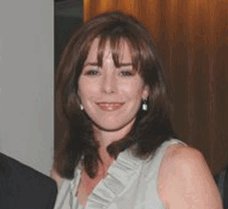 (Dallas)—- Citing City Hall official audio recordings, neighborhood and environmental groups are accusing Dallas City Attorney Tammy Palomino of blocking the City Plan Commission’s intentions to adopt a stricter gas drilling rule governing how far wells can be located from neighborhoods and schools.
(Dallas)—- Citing City Hall official audio recordings, neighborhood and environmental groups are accusing Dallas City Attorney Tammy Palomino of blocking the City Plan Commission’s intentions to adopt a stricter gas drilling rule governing how far wells can be located from neighborhoods and schools.
“It’s a clumsy attempt to steamroll the Commission, made even more embarrassing by the fact that it’s captured on tape,” said Zac Trahan with Texas Campaign for the Environment. “She’s stepped out of her role as an objective advisor, and become an advocate for a much less protective ordinance – even after the Commission made it clear they want a stronger one. Residents can’t trust her.”
In a letter to Mayor Mike Rawlings and the Dallas City Council, Trahan’s group, along with Downwinders at Risk, FracDallas, Dallas Area Residents for Responsible Drilling, Climate Reality Leadership Corps, and the Dallas Sierra Club complained that the evidence of Palomino’s bias was so blatant that the Council needs to appoint an outside lawyer to advise it and the Plan Commission on the writing of the new gas drilling ordinance.
At issue is one of the most important restrictions a municipality can place on gas drilling – the buffer zone or “setback” distance between a gas well and a home, school or other “protected use.”
Currently Dallas allows drilling within 300 feet of those kinds of structures, a holdover from the original 2007 drilling ordinance that is now being rewritten by the Plan Commission. At an earlier June meeting, Commission members reached a consensus to lengthen that distance to 1500 feet, with no objection. But when it was time to recap the results of that meeting, Attorney Palomino denied such a consensus ever occurred as part of the official record.
However, the city maintains audio recordings of every Plan Commission meeting and according to the recording of that June meeting, the intent of the Commission was clear, despite Palomino obvious attempts to get them to back down to a less protective distance. The groups released excerpts from the June meeting:
Commissioner Anglin: “The mandate generally would be, in my view, 1,500 feet generally and a 2/3rd [vote] waiver down to 1,000 feet.”
Commissioner Ridley: “I agree with that.”
Chair Alcantar: “OK, any comments?”
(The audio is silent)
Assistant City Attorney Tammy Palomino: “Commissioner Anglin recommended 1,500 feet, do we need to have more debate on that? Is there a majority that wants to go back to 1,000 feet instead of 1,500?”
Chair Alcantar: “I think we are all in agreement on 1,500…you got that, Tammy?”
Assistant City Attorney Tammy Palomino: “I do…I will draft the changes to the spacing.”
Despite this promise, Palomino showed up at the next meeting with no such changes reflected in the draft. Surprised at the omission, a Plan Commission member quizzed her. Again, the groups point to excerpts from the July meeting:
Commissioner Paul Ridley: “At the last meeting we had a consensus on 1,500 feet. Why is that not reflected in the base draft?”
Assistant City Attorney Tammy Palomino: “Because at the last meeting at the end I said that staff needed to look at that because those numbers are different….from what the task force recommended….and we need to come back and provide information on how that may or may not affect land use….We did not have a consensus on that, either.”
Despite a consensus from the Commission itself to adopt a setback of 1,500 feet, Attorney Palomino is unilaterally vetoing the recommendation in the running draft of the ordinance – a draft that only she is allowed to keep.
“When she says ‘we did not have consensus on that,” she’s not telling the truth” said Jim Schermbeck of Downwinders at Risk. “In fact, the Commission did reach consensus, but it was one that Attorney Palomino didn’t like. Apparently she feels like her vote counts more than all of those on the Commission combined.”
Representatives from the groups say Palomino’s motive is clear – to weaken the new ordinance enough to allow the resubmission of the twice-rejected Trinity East gas permits that have been the center of controversy for the last nine months.
They claim the same thing that’s happening now with the Plan Commission has happened before. According to their letter, “This problem of staff bias towards the Trinity East permits has been omnipresent at Dallas City Hall since the 2007 secret deal between Trinity East and City Manager Mary Suhm was signed. There has been a long trail of contorting the process over the last six years.”
To prevent the same bias from twisting the process this time, the groups request the Mayor and Council appoint outside counsel for the drafting of the gas-drilling ordinance.
The Plan Commission’s next workshop on the gas drilling ordinance is this Thursday, August 8th, beginning at 8:30 a.m. in Room 5ES of Dallas City Hall. The agenda calls for a discussion of a wide range of issues concerning how to regulate drilling in Dallas, including a “review of the draft ordinance” so far, and a revisiting of “previous topics.”
Because of Ms. Palomino’s insistence that the 1,500ft setback has not been decided, the groups expect more debate within in the Plan Commission itself on Thursday in any review of the process-to-date.
Follow-Up: Silica Air Pollution at Fracking Sites Out of Control
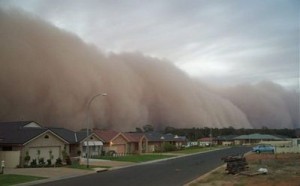 Last summer we told you about a nationwide Centers For Disease Control/National Institute for Occupational Safety and Health (NIOSH) warning to gas and oil field workers about rampant silica air pollution at fracking sites throughout the country. Research had found that pollution standards were being trampled at every site they tested. These were all tests done within the fence line of the well site, so nobody knows what the off-site impacts were/are, or how far downwind they can extend.
Last summer we told you about a nationwide Centers For Disease Control/National Institute for Occupational Safety and Health (NIOSH) warning to gas and oil field workers about rampant silica air pollution at fracking sites throughout the country. Research had found that pollution standards were being trampled at every site they tested. These were all tests done within the fence line of the well site, so nobody knows what the off-site impacts were/are, or how far downwind they can extend.
Now comes a recent follow-up report that breaks down all the information that was the basis of that 2012 industry warning, and its gruesome. Because it's so detailed, we're pasting it in blocks below in one narrative feed.
Fracking uses a lot of sand. There's an entire silica pollution cycle within fracking that's only now getting the attention it deserves. The mining of sand for fracking can take place miles away from the gas or oil plays and threaten new areas never touched by a well. It takes lots and lots of water. There are lots and lots of trucks, and lots of silica in the air at the mine. Just ask the folks along the Red River, to the northwest of DFW in what used to be pristine rolling timbered hill country.
Once it gets to the fracking site, it creates the clouds of silica air pollution that OSHA is so concerned about. The level of exposure the feds found at some of the fracking sites they studied was "enough to overwhelm the maximum use concentration ratings for the half-mask, air-purifying respirators that workers typically wore" while working at the site. Breathing silica is like breathing sand or cement into your lungs. Eventually it fills them up and hardens your air passageways and you suffocate to death. Happens in the cement industry a lot. We know this is a real and current hazard to workers at the site. We have no idea what kind of hazard it is to people off-site. None. Zero. Nada.
This is why regulators must be cautious in deciding things like "setback distances." The difference between 1000 and 1500 feet could be a dramatic drop-off in silica pollution. That could be an important margin of error for public health we need but don't know much about right now.
Here's the story from Robert Iafolla in Bloomberg:
Workers' Silica Exposure at Fracking Sites Far Exceeds OSHA Limit, NIOSH Study Finds
The concentration of silica in the air workers breathe exceeded occupational health criteria at all 11 hydraulic fracturing sites tested by the National Institute for Occupational Safety and Health, the American Industrial Hygiene Association announced July 31.
Researchers measured the silica levels of more than 100 personal breathing zone samples at fracking sites in five states, finding levels above the Occupational Safety and Health Administration's permissible exposure limit (PEL), NIOSH's recommended exposure limit (REL), and the American Conference of Governmental Industrial Hygienists threshold limit value (TLV).
In some instances, the samples exceeded OSHA's PEL by a factor of 10 or more. That level of exposure is enough to overwhelm the maximum use concentration ratings for the half-mask, air-purifying respirators that workers typically wore, the study said.
“Although effective engineering controls for crystalline silica are well established in other industries, controls to limit silica-containing dust generation during hydraulic fracturing are only now emerging due to the relatively recent understanding of the hazard and magnitude of exposure risks,” the study authors wrote.
The study appears in the Journal of Occupational and Environmental Hygiene, published jointly by AIHA and ACGIH.
NIOSH first flagged the occupational hazard of silica exposure at fracking sites in a June 2012 Hazard Alert. The journal article describes the research that informed that alert (42 OSHR 576, 6/28/12).
Silica sand is a crucial and common component in many fracking operations. Silica is often mixed with the water and chemicals injected into shale formations during fracking, with silica acting as a “proppant” to keep the underground fractures open to allow oil or natural gas to flow. Approximately 28 million metric tons of silica sand was used in fracking during 2012, according to the U.S. Geological Survey.
The heavy use of silica is reflected in the air contamination at fracking sites. Just over half of the 111 samples that NIOSH tested exceeded the PEL for silica, while 69 percent exceeded the REL, and 84 percent exceeded the TVL.
OSHA's PEL is calculated from the percent of crystalline silica in the respirable dust; the PEL for 100 percent silica would be 0.1 milligram per cubic meter of air. NIOSH's REL is 0.05 milligram per cubic meter, and the ACGIH's TVL is 0.025 milligram per cubic meter.
OSHA's proposed regulations for silica could lower the PEL to 0.05 milligram per cubic meter, although that has been met with fierce resistance from industry. The proposal has been on hold at the White House Office of Management and Budget since February 2011.
Researchers took samples at fracking sites at five shale formations: Bakken in North Dakota, DJ Basin in Colorado, Eagle Ford in Texas, Fayetteville in Arkansas, and Marcellus in Pennsylvania. The fracking operations at those locations used silica as the proppant, with the exception of the Bakken site, where 60 percent of the proppant was a ceramic material.
None of the 10 samples taken at Bakken exceeded OSHA's PEL. Two-thirds of the samples at Marcellus, 54 percent at Fayetteville, 53 percent at DJ Basin, and 50 percent at Eagle Ford went over the PEL.
Typical fracked gas or oil wells go through 12 to 20 stages, with each stage requiring hundreds of thousands of pounds of sand, creating airborne dust at the sites, the study said.
Sand is delivered from tractor trailers and pumped with compressed air through fill ports into on-site storage and delivery vehicles known as “sand movers.” Those sand movers use motor-driven belts called “dragon tails” to supply sand to blender trucks, with larger loads requiring multiple vehicles moving sand across a transfer belt. Blender hoppers pump the sand-as-proppant through a manifold, piping, and into the well.
Workers operating sand movers and transfer belts are exposed to the highest levels of silica, the study said.
Overall, the study found seven points of dust generation that were common at all 11 sites:
• from “thief hatches” on the tops of sand movers during filling,
• from the sand mover belt,
• from the momentum of falling sand below the dragon tail at the blender hopper,
• from transfer belts when sand is deposited onto the belt and conveyed to the blender,
• from sand leaving the end of the dragon tail,
• from fill ports of sand movers during refilling operations, and
• from truck traffic at the fracking site.
The study said that about 435,000 workers were employed in the U.S. oil and gas extraction industry during 2010, with nearly half employed by well servicing companies, including companies that use fracking.
The study “Occupational Exposures to Respirable Crystalline Silica During Hydraulic Fracturing” is available at http://tinyurl.com/mn5sbc3.
Dallas Public Participation Rollback Continues: Staff Eliminates Aug 15th Public Hearing, Provide None in Evening
 And just like that, Dallas City Hall decides that more public participation in writing the new gas drilling ordinance isn't what they want after all.
And just like that, Dallas City Hall decides that more public participation in writing the new gas drilling ordinance isn't what they want after all.
Less than two weeks after releasing a proposed schedule for the City Plan Commission that included three public hearings on the subject, city staff issued a revised schedule for the Plan Commission that scraps the first public hearing for August 15th, and leaves the other two in the middle of the day despite appeals from the Plan Commission itself to arrange for evening public hearings.
Now, the first chance citizens will get to weigh in will be August 22nd at 1:30 pm instead of 4 to 6 pm on the 15th.
What is City Hall scared of? You.
If they had their way, some city staff would sequester members of the CPC in an undisclosed location for the duration of this process, with no opportunity to get contaminated by views other than their own – which are motivated by still trying to accommodate the discredited Trinity East permits.
You represent a complete repudiation of that point of view.
You're armed with the latest science. They want to rely on 2-year old Dallas Task Force recommendations that they also engineered to help Trinity East and ignore everything that came after that.
You're armed with real-life experience of what it's like to live near these kinds of operations. They want the CPC to rely on the soothing assurances from industry and paid-for regulators.
You want an objective reckoning of the facts and hazards. They want to find a way to get Trinity East its permits.
The Plan Commission meets this Thursday at City Hall beginning at 8:30 am in room 5ES with another workshop session lasting until at least 1:30 pm coving topics such as Pad Operations, Site Monitoring, and Permitting. There will be no opportunity for official public comment, but if you want to make unofficial comments on how undemocratic this process is becoming, be our guest. Concerned citizens need to take back their city from out-of-control staffers who want to give permits to discredited companies and sites based on secret deals, no matter the cost to public health or safety. Grabbing back control of the reigns becomes a public duty at this point.
New Proposed Schedule for City Plan Commission Drafitng of Gas-Drilling Ordinance
AUGUST
August 8th Meeting
8:30 – 9:00 am Review of Draft Ordinance
9:00-10:30 am Review of Topics
Pad Site Operations
Gas Drilling/Well Permit
Bonding Requirements
Site Monitoring and Review of Permit Application
Required Plans
10:30-11:00 am
Summary of discussion topics for the day
Revisit previous topics
11:00 am -1:30 pm – CPC Briefing (working lunch)
1:30 pm – CPC hearings on zoning cases
Immediately following CPC Public Hearing – 6:00 pm
Continue discussion of unfinished topics for the day
AUGUST 22 Meeting
8:30 am – 9:00 am Review of Draft Ordinance
9:00 am -10:30am
Physical Pad Site
Emergency Response
Abandonment and Restoration
10:30-11:00
Summary of discussion topics for the day
Revisit previous topics
11:00-1:30 CPC Briefing (working lunch)
1:30pm: 1st CPC Public Hearing on Gas Drilling
SEPTEMBER
September 12th Meeting
8:30 – 9:00
Review of drafted provisions of the Ordinance
9:00-10:30
Discussion of next Topics:
Air Quality
Water
Seismic Permits
Pipelines
Compressors
10:30-11:00
Summary of discussion topics for the day
Revisit previous topics
11:00-1:30
CPC Briefing (working lunch)
September 26
8:30 – 9:00
Review of drafted provisions of the Ordinance
9:00-10:30
Finish discussion of topics from previous meeting
10:30-11:00
Summary of discussion for the day
Revisit previous topics
11:00-1:30
CPC Briefing (working lunch)
1:30 pm: 2nd AND LAST Public Hearing on Gas Drilling at CPC
After public hearing – vote to make recommendations to City Council
After You Allow It, How Will You Police It?
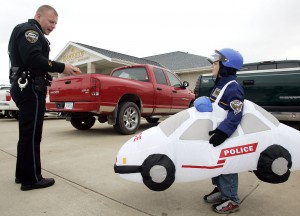 Not very well, if you're allowed to do it in Texas. The prolific Peggy Heinkel-Wolfe has the story of why a fracking well blow-out in the middle of Denton got such a slack response from all those who were supposed to be protecting the public from these kinds of things.
Not very well, if you're allowed to do it in Texas. The prolific Peggy Heinkel-Wolfe has the story of why a fracking well blow-out in the middle of Denton got such a slack response from all those who were supposed to be protecting the public from these kinds of things.
One huge problem with the new Dallas gas ordinance is that it will require a multi-staffed new Office of Gas Inspections available to answer calls 24/7. Time and again, City Hall staff's response to questions about who's going to be responsible for enforcing the regs of the ordinance is simply, "The gas inspector will do that."
But no one at City Hall has a clue how much that would cost, what it would entail or how soon it would be established if ever. Not a single council person has advocated funding for such an office. So you know, we're all in favor of fracking, but regulating the stuff, not so much.
Moreover, the actual City of Dallas department that would host such a position, the Office of Environmental Quality, has been completely MIA in all the proceedings of the last year – ever since the 2011 Task Force went out of business last February or so. No input has been provided or requested from the OEQ to better understand how this new bureaucracy is supposed to work.
You can't rely on EPA. They have nobody in the field to help. You can't rely on the state – as Peggy's story makes clear. And Dallas can't be bothered to think about these things now while they're still busying themselves trying to make a land swap with Trinity East so it can get the company its permits. Like everything else about drilling in Dallas under Mike Rawlings and the still-hovering Mary Suhm, all other details, problems, policies, etc have to take a back seat to fulfilling the secret deal Trinity East and the City made. Nothing else matters until these permits are in place. Those are the priorities at City Hall today.
City Hall Apparatchiks Rewrite History, Now Say 1500-Foot Setback Vote Never Happened
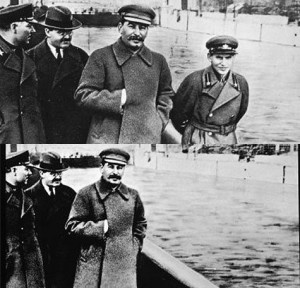 Any doubt that Dallas City Hall is more interested in protecting the Trinity East gas leases than Dallas residents as it writes a new gas drilling ordinance was surely removed yesterday when City Attorney Tammy Palomino flatly lied and told City Plan Commission members that they had not decided on a 1500-foot setback, or buffer zone, between homes and other "protected uses," even though they had done precisely that at their June 20th meeting.
Any doubt that Dallas City Hall is more interested in protecting the Trinity East gas leases than Dallas residents as it writes a new gas drilling ordinance was surely removed yesterday when City Attorney Tammy Palomino flatly lied and told City Plan Commission members that they had not decided on a 1500-foot setback, or buffer zone, between homes and other "protected uses," even though they had done precisely that at their June 20th meeting.
Employing the Orwellian language of a Soviet history writer, Palomino simply choose to ignore the results of a decision she didn't like and pretend the vote never happened. She argued that there was "no consensus" on the CPC for a 1500-foot setback – even though that very word was used to describe the results of June 20th meeting by CPC members themselves, as well as the media.
Instead, she handed out an official "summary" of CPC drilling recommendations to-date that not only only didn't include ANY mention of the 1500-foot setback decision, but instead listed a 1000-foot setback limit that had specifically been rejected by the Commission!
That missing footage is critical. 1000-foot setbacks, with a variance (or exception) up to 500-feet, were recommended by the city's gas drilling task force, but we now know those recommendations were tailored to fit the circumstances of the Trinity East lease sites along the Trinity River in northwest Dallas. That is, with a variance that could put wells 500 feet from homes, the Trinity East sites could be approved. With the CPC's 1500 foot-setback, there's only a variance to 1000 feet. That makes it impossible for Trinity East to set up shop where they want. And that's why Palomino deliberately, but unethically, left the 1500 setback out of her "summary."
The problem for Palomino in trying to pull this kind of disappearing act is that there were way too many witnesses to the original vote, including reporters. According to KERA's account "One of the first changes that grabbed consensus of the Plan Commission was an increase to the buffer zone or setback between gas wells and homes, businesses, schools, and recreational areas. Plan Commissioners want 1500 feet, not the 1,000 recommended by the task force." Channel 4 reported the same thing. There's also the fact that the city archives audio tapes of every CPC meeting, and citizens have have begun to videotape the meetings to catch this kind of bullying by staff.
What all of this will show is that on June 20th CPC member Paul Ridley took great pains to clarify that the CPC had indeed reached a consensus that they wanted a 1500 foot setback – considered the most protective setback currently used by any North Texas city. He even asked the question, "Do we have consensus on this?" and heads all nodded and not one verbal objection can be heard – other than from Tammy Palomino – who is stuttering that the city attorneys are going to have to make sure they can do this (no explanation of why Dallas can't). There's no question about what happened.
Which is why even the most cynical observers were shocked at the clumsy effort by Palomino to erase the decision from history by way of her "summary." It's like the City can't pass up an opportunity to create an ethical crisis whenever it deals with the Trinity East leases.
All the video and audio tape is being assembled into a nice neat package for the public and media. The case against Tammy Palomino will be devastating. As a result of her premeditated misrepresentations, Palomino should resign, or at the very least be re-assigned away from work on the new gas ordinance. She's representing Trinity East in these proceedings, not the citizens of Dallas.
Yesterday's episode was but the most extreme example of the kind of bullying and steamrolling that staff is employing against the CPC to end up with an ordinance that is Trinity East-friendly. As they have for the past three years or so, they're contorting the system to make it fit Trinity East's permits.
Besides the setbacks issue, staff really wants the CPC to OK gas drilling in parks, and a majority of CPC members today were willing to say out loud they supported that goal. That's right – after 7 months of crowds filling city hall to protest drilling in parks, Official Dallas is still moving toward approval of that idea. It's based on the idea of "unused" park land – a concept that has never been defined by the city or anyone else.
Trying to further this goal, staff actually came to Thursday's meeting with a US Parks Department definition of "active" and "passive" park land with the idea that Dallas could adopt something similar and allow drilling on the "passive" acreage. According to the list, "passive" park land is defined as land used for hiking, rock climbing, horseback riding, mountain biking, and camping, among others activities. Sounds pretty "active" doesn't it? Despite their propensity to allow park drilling it struck the CPC the same way and they firmly rejected staff's approach. Still, just like the 1500 foot setback issue, staff won't be satisfied until they get Trinity East what it wants.
Which brings us to a hard truth that the media and the public need to absorb. As bad and blatant as it is, Tammy Palomino's unethical behavior is only a symptom of a much larger rotten problem with this entire gas drilling ordinance process that has been present from before the task force was created right up until now. It's impossible for staff to both be advocates for the Trinity East leases in the writing of a new gas ordinance and give objective counsel to the CPC and Council on how to write the most protective ordinance. They cannot serve two masters.
Palomino and others have been told they need to find a way to make sure Trinity East gets what it wants in this new gas drilling ordinance. That makes city staff just another lobbying arm of Trinity East, not honest brokers trying to produce the best and most protective policy for Dallas residents. Every piece of advice they give is meant to further the leases, not the public good.
Because of this fact, an independent counsel needs to be brought in for the purpose of helping draft this new gas drilling ordinance. Policymakers need to have the best information, the most objective information, if they're going to make good policy. They're not getting it from city staff when it comes to drilling.
It's time to quit pretending this isn't a big problem. When city attorneys start trying to erase public policy decisions because they conflict with a private interest they're serving, the system is no longer working. It's corrupt and must be replaced before that corruption is allowed to spread.
Stay tuned. You're going to be hearing a lot more about this.
Scheduling Note: Although the CPC released a schedule for its work on the drilling ordinance only last week, including three public hearings, things may be changing quickly with additional workshop times and different dates and times for hearings. There was a lot of talk about schedule changes on Thursday, but nothing was decided. Right now the first opportunity for you to express outrage at this latest development is a public hearing slated for August 15th, 4 to 6 pm, at City Hall but stay tuned to make sure.
It’s Official: Trinity East Zombie Permits Coming Back; Dallas Gas Ordinance Rewrite Schedule Released – 1st Public Hearing August 15th
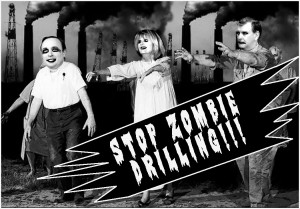 They just won't take a big fat public "No!",
They just won't take a big fat public "No!", or two, or three, for an answer.
We've learned form sources inside City Hall that Trinity East – with a big assist from City of Dallas staff and Mayor Mike Rawlings – is preparing to once again attempt to permit its three proposed drilling and refinery/compressor station sites along the Trinity River.
While the company and city staff keep trying to win support for a weaker new gas drilling ordinance than citizens have repeatedly requested, a deal is being wheeled that would have Trinity East trading its lease on park land for another piece of city-owned property in northeast Dallas. Meanwhile, the City is also working feverishly to firm up support for its official position that it can't possibly turn down Trinity East without losing a lawsuit – an opinion no one outside of City Hall, save Trinity East, shares so far.
Yeah, the secret gas deal that the Observer uncovered in February got City Manger Mary Suhm to finally leave the building come December, but she's not going until she gets those Trinity East sites permitted the way she promised behind closed doors.
All of which makes the writing of a brand new Dallas gas drilling ordinance even more important now. And last week the City Plan Commission released its two-month schedule of how that's going to be done (see below), complete with three (daytime) public hearings with an ETA to the City Council by October.
There will be just six more meetings of the Plan Commission to review the almost two-year old Dallas Gas Drilling Task Force recommendations and decide to take them at face value, strengthen them, or weaken them. Scatted among these will be three public hearings – the first one in a little over two weeks on August 15th from 4 to 6 pm. The Commission goal is to get a new drilling ordinance to the City Council by October, when the terms of current members expire.
That's the official agenda. The unofficial one is trying to find ways to weaken the new ordinance enough to allow Trinity East to be able to get their proposed sites permitted. There's already been plenty of evidence at previous meetings indicating how desperate staff is in trying to give their departing boss a going-away gift.
We know most of you can't come to the Plan Commission workshops on Thursday mornings to follow the nitty-gritty of how this plays out. We'll be there reporting that to you, no problem. But what we can't do is manufacture warm bodies to put in seats for those three public hearings. Please make it a point to show up at one or more of these – and in particular, the very last one on September 26th as it rolls into the City Council.
Trinity East lobbyist Dallas Cothrum is on record as saying the company's three previously proposed sites on parkland, flood plains and near a new soccer complex that have now been rejected twice by this same CPC were the "best possible" places the company could have chosen for drilling and processing. So now the battle is over the less-than-best possible places. We can't wait to see what part of town the City and Trinity will decide to sacrifice for that designation as part of their possible land-swap deal.
Making sure a new drilling ordinance is the most protective it can possibly be is the only way left to finally drive a stake through the heart of the Trinity East gas permits. You have no idea how much we hate to ring the alarm about these damn permits again, but the stakes are very high and we're on the verge of winning one of the Barnett Shale's biggest citizen victories – if we can just keep the pedal to the metal. Bring your lead feet to the first hearing on August 15th.
Schedule for the City Plan Commission's Workshops and Public Hearings on the New Gas Drilling Ordinance
(All workshop meetings start at 9 am and take place on the 5th floor at 5ES in City Hall unless otherwise indicated. Specific Room locations for the Public Hearings at City Hall will be announced. Topic #’s refer to the Dallas Gas Drilling Task Force Recommendations Matrix.)
THURSDAY, JULY 25
9:00 am – 12 Noon CPC Workshop
• Topic 4 – Pad Site Operations
THURSDAY, AUGUST 8
9:00 am -12 Noon CPC Workshop
• Topic 9 – Gas Drilling/Well Permit
• Topic 14 – Bonding Requirements
• Topic 15 – Site Monitoring and Review of Permit Application
THURSDAY, AUGUST 15
1:30 pm – 3:30 pm Workshop
• Topic 13 – Required Plans
THURSDAY, AUGUST 15th PUBLIC HEARING: 4:00 – 6:00 pm
THURSDAY, AUGUST 22
9:00 am to 12 Noon CPC Workshop
• Topic 1 – Air Quality
• Topic 2 – Water
THURSDAY AUGUST 29
9:00 am – 10:45 am CPC Workshop
• Topic 3 – Physical Pad Site
• Topic 16 – Emergency Response
• Topic 5 – Abandonment and Restoration
THURSDAY, AUGUST 29th PUBLIC HEARING: 11:00 AM -12:00 NOON
THURSDAY, SEPTEMBER 12
9:00 – 12 Noon CPC Workshop
• Topic 10 – Seismic Permits
• Topics 6 – Pipelines and Compressors
THURSDAY, SEPTEMBER 26th PUBLIC HEARING 1:30 PM -?
(Agenda: What to recommend to City Council)
TCEQ: Eagle Ford Gas Pollution Making San Antonio Smog Worse
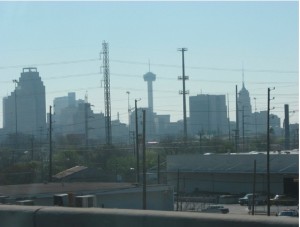 According to a new study from the Texas Commission on Environmental Quality and the Alamo Area Council of Governments, air pollution from the Eagle Ford gas play in South Texas will increase smog levels in San Antonio by 3 to 7 parts ber billion by 2018, the year the nation's metro areas are supposed to be in compliance with a new tougher federal standard.
According to a new study from the Texas Commission on Environmental Quality and the Alamo Area Council of Governments, air pollution from the Eagle Ford gas play in South Texas will increase smog levels in San Antonio by 3 to 7 parts ber billion by 2018, the year the nation's metro areas are supposed to be in compliance with a new tougher federal standard.
Because San Antonio's air is already in violation of federal standards, a rise in ozone levels of even 1 ppb matters. San Antonio's ozone average is at 80 ppb and the federal standard is at 75 ppb.
Since it relied on TCEQ engineers and TCEQ computer models, one can safely assume this study is underestimating the problem of this pollution.
On the otheFrom the beginning of the fracking boom, it's been the contention of Rick Perry's TCEQ that gas industry pollution from the Barnett Shale has no significant effect on DFW smog. "All the wells are west of central DFW" goes the rationale, even as Dallas debates new drilling and refinery permits. A lot of us, including atmospheric scientists who study this sort of thing, beleive differently.
For two years in a row, air quality in DFW has gotten worse, not better, They've been more violations and they've moved further east. While 2013 has the potential to be the best year for smog in DFW this decade, it may have much more to do with the cooler, wetter weather than any large decreases in pollution inventories. However, given the impacts outlined
